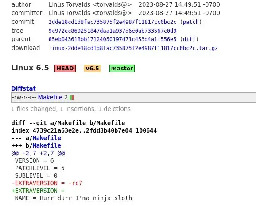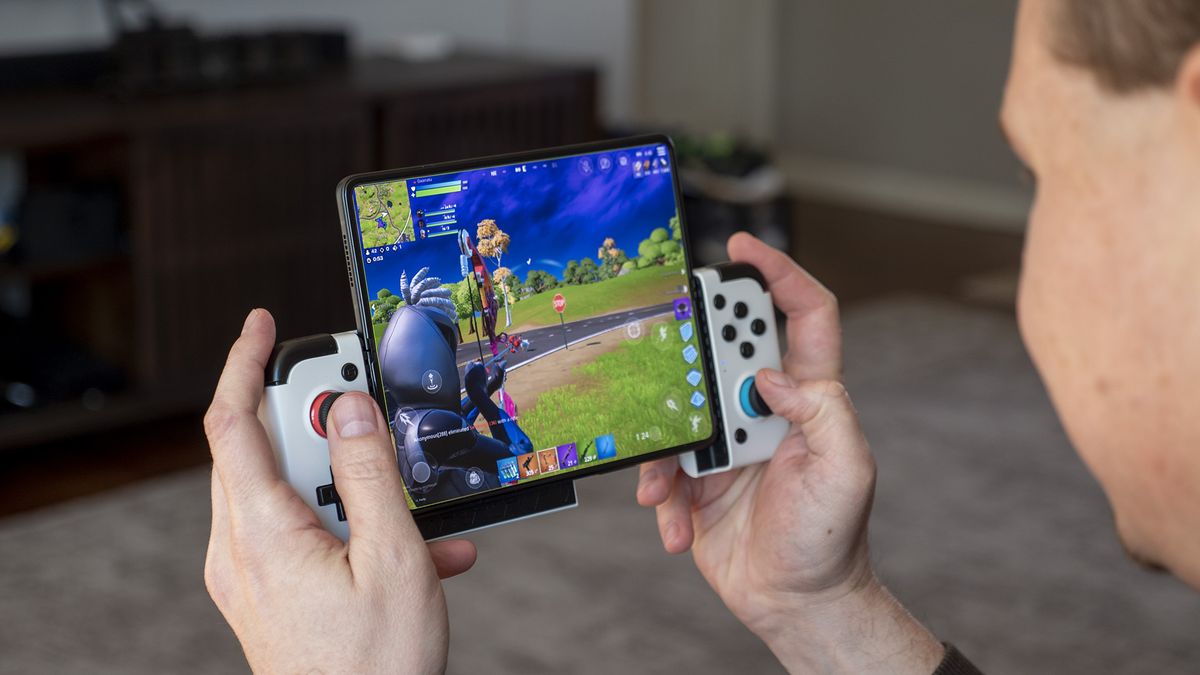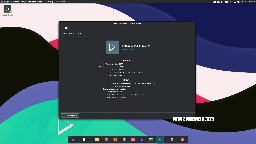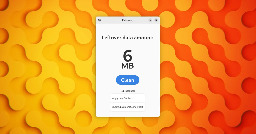Modder Turns Framework Laptop PCB Into a Handheld Gaming PC













All valid concerns, but if you really wanted to, you could roll your own home automation setup using something like a Raspberry Pi, and optionally Home Assistant, and keep it all offline so that it's safe from hackers.







Not possible. At least, not yet. Two main reasons for this:
1. There is no standardized BIOS/UEFI equivalent in ARM, as a result, the boot process in every ARM system differs in general. The only "standardized" boot process you'd see would be for that particular type of system from a single vendor, eg the way most Android devices boot is generally the same - although even in Android, some manufacturers make their own changes, for instance Samsung introduces their KNOX into the picture, some devices use the A/B partition system but some dont, etc.
The lack of a standard boot/initialisation process, and the lack of a hardware auto-detect feature, means you can't just mix and match components like you'd do in a PC - the bootloader wouldn't know how to initialize those hardware bits, heck, it wouldn't even know the hardware existed unless you manually defined it somewhere - this is done using something called a Device Tree, which, although is a standardized format, still needs to be manually created, and also, the bootloader used needs to support this in the first place (like UBoot, but not all ARM systems use this).
2. The other reason is lack of standardized hardware. In the x86 world, PCs have a rich ecosystem of standardized components, from motherboards to graphics cards, which have evolved over decades, and standards were developed organically over time - and agreed upon by other manufacturers. Sometimes these standards were made or guided by special interest groups / consortiums / other regulatory boards etc. ARM lacks this.
But it wasn't always like this in the PC world, back in the early days of personal computing, you had different types of PCs and hardware that were basically incompatible with each other, similar to the ARM systems of today. It was mainly due to the popularity of IBM PC, that things began to change. Unlike many other computers of its time, the IBM PC had an open architecture. This meant that its specifications and designs were made publicly available, allowing third-party manufacturers to produce compatible components and peripherals. One of the key features of the IBM PC was the Industry Standard Architecture (ISA) bus (the precursor to the PCI bus), which allowed for the addition of third-party cards. This established a standard for expansion that was widely adopted and emulated.
As IBM PCs gained in popularity, other manufacturers started producing "IBM compatibles" or "PC clones." These machines were designed to be hardware and software compatible with the IBM PC. Companies like Compaq successfully reverse-engineered the BIOS, allowing them to create systems that could run software designed for IBM PCs. Also, IBM's choice of using Microsoft's MS-DOS as the operating system was crucial. As DOS became the de facto OS for PCs, software developers focused their efforts on creating software for this platform. This drove further hardware standardization as manufacturers aimed to produce hardware compatible with MS-DOS and its applications. As the industry grew, this lead to the creation of more standards, some of them competing, some losing out due to lack of popularity etc. The result is the PC world that you see today.
ARM lacks all of this rich history. Where ARM is at right now is where PCs were at before the introduction of the IBM PC. We need to go thru all those motions again to be able to build your own PC. But I don't see this happening any time soon, in fact it's doubtful if it'll ever happen, since the trend these days is for vendors to build closed, unrepairable, unserviceable systems - so that you get locked into their ecosystems, so that you're forced to upgrade your entire device just to get say, more RAM or whatever. And unfortunately, even PC manufacturers are picking up on this trend, as we're seeing with laptops.
So unless something changes drastically, like some big manufacturer stepping forward to create an open ARM PC and ecosystem, being able to build your own ARM PC will remain a pipe dream.
The thing is though, with traditional forums you get a LOT of controls for filtering out the kind of users who post such content. For instance, most forums won't even let you post until you complete an interactive tutorial first (reading the rules and replying to a bot indicating you've understood them etc).
And then, you can have various levels of restrictions, eg, someone with less than 100 posts, or an account less than a month old may not be able to post any links or images etc. Also, you can have a trust system on some forums, where a mod can mark your account as trusted or verified, granting you further rights. You can even make it so that a manual moderator approval is required, before image posting rights are granted. In this instance, a mod would review your posting history and ensure that your posts genuinely contributed to the community and you're unlikely to be a troll/karma farmer account etc.
So, short of accounts getting compromised/hacked, it's very difficult to have this sort of stuff happen on a traditional forum.
I used to be a mod on a couple of popular forums back in the day, and I even ran my own community for a few years (using Invision Power Board), and never once have I had to deal with such content.
The fact is Lemmy is woefully inadequate in it's current state to deal with such content, and there are definitely better options out there. My heart goes out to @Chris and the staff for having to deal with this stuff, and I really hope that this drives the Beehaw team to move away from Lemmy ASAP.
In the meantime, I reckon some drastic actions would need to be taken, such as disabling new user registrations and stopping all federation completely, until the new community is ready.
FWIW, my (non tech-savvy) mum and dad have been running Zorin for years (and Xubuntu prior to that), without any issues. The only times I've had to intervene is for doing an OS upgrade, which was a manual process, but Zorin now includes a GUI upgrader which should make things even more easier.
Folks who claim Linux is too unstable or complicated for home users, and think you need to use the commandline for every small thing, should check out Zorin (or talk to my mum and dad!).
I have an account on world, and I've not come across any fascist stuff. Then again, I've blocked several communities like politics, where such people may tend to congregate.
Personally, I treat Beehaw as a standalone community. I do not really see the point of Beehaw federating with others, when the rules, and feel of the community, is so different.
I prefer using a Beehaw account for Beehaw, even gave it a yellow colored theme so it's clear that I'm browsing Beehaw, and know that it's "safe" browsing Local/New.
If people really felt strongly about this, we would've seen it being done already. Perhaps the state of Lemmy right now is "good enough" so folks don't care too strongly about a lack of a minor feature, or maybe they find it easier to just migrate to something like Kbin instead and still be federated to Lemmy. Or maybe they prefer to just write a simple patch, which can be maintained and distributed separately, instead of forking the entire code. Afterall, it's easy enough to make a fork, but a PITA to maintain one. Much more easier to just make a separate patch set or standalone utilities or something.
Also, frontend features, like the infinite scrolling one which was quoted, are basically non-issues, considering so many good alternative frontends exist, such as Photon, Alexandrite, mlymm, slemmy, etc. There's no rule you have to use the default frontend. In fact many Lemmy instances have decided to host these frontends on their own servers, and if they wanted to, they could easily switch to it and make it the default landing page.
Katamari Damacy - The objective is to roll a ball-like thing called a katamari, to roll up objects, and make the katamari bigger and bigger. You can roll up anything from paper clips and snacks in the house, to telephone poles and buildings in the town, to even living creatures such as people and animals. Once the katamari is complete, it will turn into a star that colors the night sky. Sounds weird, but it's super fun, trust me. Plus, it's soundtrack is kickass.
Also, the article doesn't mention anything about nanoplastics, which are far more dangerous. Nanoplastics have a larger surface area, which makes them more reactive - they can also penetrate cells, and cause damage to DNA, proteins, etc.
That's highly unlikely. Samsung phones aren't very custom-ROM friendly, especially if you're going for a recent device like OP did. Also, Samsung devices use a hardware eFuse which is blown up the moment you unlock the bootloader, which permanently voids the warranty, and permanently disables some Samsung features, which also reduces the resale value of the phone.
So, I wouldn't advise rooting/ROMming a Samsung. Best to get something like a Pixel instead.
Summarising articles / extracting information / transforming it according to my needs. Everyone knows LLM-bssed summaries are great, but not many folks utilise them to their full extent. For instance, yesterday, Sony published a blog piece on how a bunch of games were discounted on the PlayStation store. This was like a really long list that I couldn't be bothered reading, so I asked ChatGPT to display just the genres that I'm interested in, and sort them according to popularity. Another example is parsing changelogs for software releases, sometimes some of them are really long (and not sorted properly - maybe just a dump of commit messages), so I'd ask it to summarise the changes, maybe only show me new feature additions, or any breaking changes etc.
Translations. I find ChatGPT excellent at translating Asian languages - expecially all the esoteric terms used in badly-translated Chinese webcomics. I feed in the pinyin word and provide context, and ChatGPT tells me what it means in that context, and also provides alternate translations. This is a 100 times better than just using Google Translate or whatever dumb dictionary-based translator, because context is everything in Asian languages.
I have the RG351MP, it's pretty nice. Solid aluminum too, so it doesn't feel cheap, but not really ergonomic for long hours of play. That's fine though, because this is the kind of device you carry around in your pocket for a short session during your commute, breaks etc. There's quite a few choices of opensource firmware that you can load onto here, and most of them have this cool app called "portmaster", which consists of native games ported over from other platforms - such as Prince of Persia (DOS), 3D Space Cadet Pinball (XP) etc, and they run really well.
My main issue with the 351MP is that although it claims to be able to emulate the Dreamcast and N64, it actually struggles with most games from those two consoles. Most notably, I wanted to play Rogue Squadron II (Dreamcast) on it and it was unplayable, the specs were too weak for it unfortunately. Which broke my heart, and I quickly lost interest in the device. I wanted a device that could comfortably emulate all consoles upto the Dreamcast, and the 351MP can only realistically handle upto the PS1.
I started looking for alternatives, and found similar drawbacks with most of these devices, none of them were capable enough to comfortably emulate the Dreamcast - unless I bought a pricey high-end device like the Aya Neo or the Steam Deck or something.
And then I realized, I could just get myself a cheap Android device from eBay (like with a bad ESN or some other non-impairing fault), pair it with a telescopic controller, and it'd be way cheaper + have better specs. So I did just that, got myself a cheap OnePlus 9 with a bad ESN for only $150 (SD 888, 8GB RAM), paired it with a Gamesir X2, loaded Dolphin emulator on it - and I was finally able to play Rogue Squadron II in all its glory - even managed to get an HD texture pack for it and it was glorious.
Eventually, I got myself a Galaxy Fold 4 as my main phone, so I didn't need the OP9 any more - my Fold 4 had better specs, plus the large 4:3-ish screen made it perfect for playing those old games.

As for my old RG351MP, it's still lying around, but I think I might sell it. The only advantage it has against my current setup is portability, but since I carry my Fold 4 everywhere, it's not really that big of an issue. Sure, I can't carry my controller everywhere either, but I'm not that desperate to want to be able to game everywhere and all the time (with physical controls).
TL;DR: Before buying a handheld, consider whether you really need that portability + physical controls, if you don't need it everywhere, then your phone (+ controller) could do a better job than most of these.
I know. I just thought it was a bit ironic seeing such a strongly worded response from it.
Just wanted to say thanks for the transparency, and thanks to the mod team for making Beehaw such a great community!
They actually didn't update it at all. The Notepad app that ships with Windows 11 (and recent Win10 builds) is actually a completely rewritten, bloated, UWP (aka "Modern") app. The old Notepad is now an "optional feature" that needs to be manually installed.
Would be cool if Beehaw switched to old school forums, like Invision or phpBB. Invision have now moved to a hosted forum model, so you don't need any technical knowledge to set it up.
I'm one of the foolish ones that actually pre-ordered the game. Was super hyped for it too, did a countdown till midnight so that I can start playing at launch, and I even live streamed it (and also had a few other streams going on two laptops). Took the day off to play the game as well.
The clock hit 00:00 and less than 30 minutes into the game, I ran into my first bug. I stuck was in a dialog loop and couldn't get out no matter what I tried, so was for forced to load an earlier save. Then I got stuck somewhere else, or something funky would happen. I'd never been so utterly disappointed in a game until Cyberpunk came along. So anyways, I was so put off by it that I'd decided not to play it any further, until they patched it all up. So the first patch came along, but this time I decided to read the reviews first - still plenty of bugs. Thought I'd wait for the next one, noope, still buggy. And the next one. And the next. And then I decided to ignore the game completely, until not only they fixed the bugs, but also added QoL stuff into the game. Like better AI, better peds, better driving etc. Make the city more immersive. I mean, I had waited for so long, so might as well wait and play until it's at it's best version.
So, not only will I not play now, nor when 2.0 comes out, I'll play it only when Phantom Liberty is out, and will enjoy the game, for the first-ish time, the way it was meant to be played.
Assuming of course that Phantom Liberty isn't a dud, but having learnt from my previous experience, I might wait a bit after it comes out and see if they release a post-launch patch or something first.
Never again pre-ordering a game... unless it's a Zelda.
So a couple of things. Z-Wave is a proprietary protocol (developed by a single company called Zensys) and is a closed ecosystem, so personally, I'm not a fan of it. And it's not great choice for interoperability either.
Zigbee on the other hand, is an open standard (IEEE 802.15.4), made by the Zigbee alliance, comprising of major tech companies. The Zigbee alliance later became the Connectivity Standards Alliance (CSA), who are the ones behind Matter. Which is why it appears as if Matter is trying to resolve Zigbee issues.
In actuality though, Matter is trying to proposition itself as a generic standard for the modern IoT world, because things have changed significantly since the times when the Zigbee and Z-Wave protocols were conceived (late 90s - early '00s). The main thing that's changed is that low-power and cheap system-on-a-chip (SOCs) and single board computers (SBCs) have taken over the world by storm, which has enabled manufacturers to push out cheap home automation products quickly. Making home automation products is no longer a traditional embedded systems and specialized electronics play, where you had to invest a lot of RnD into designing complex circuits, pay for a Z-Wave license etc. Nowadays, even a kid could make their own system using a Raspberry Pi and say Python, without needing any knowledge of low-level protocols or languages.
As a result, the home automation world is filled with too many manufacturers and products, all trying to do their own thing and in-effect, building several closed ecosystems, even though they're all basically using the same protocols behind the scenes. Plus you also have the existing Zigbee and Z-Wave products.
So before Matter came into the picture, several manufacturers started making their own centralized hubs, as a means for interoperability, like Samsung's SmartThings, or Apple's HomeKit etc. Some even have their own closed hubs meant for their own ecosystem of devices, like the Philips Hue bridge. As a result, some homes may even have multiple hubs, with overlapping functionality.
Matter aims to unify all of that. So instead of Philips doing their own thing, instead of Samsung coaxing manufactures to make their systems compatible with SmartThings, instead of manufacturers kissing Apple's ass to support their products, instead of x company making some half-baked bridging app for y company because the specs haven't been fully documented or they simply don't care.. we have Matter. Matter aims to solve that mess, at least, on paper. It would still require manufacturers to actually buy into the idea and support the protocol, but at least it's better than working individually with Samsung and Apple and Amazon etc, or reinventing the wheel and doing their own thing.
Still I'm not convinced of Steam OS compared to Windows 11, since I would like to play also Epic games and maybe some emulators
How much time, relatively speaking, do you spend playing multiplayer Epic games? If it's more than 50%, then yeah, SteamOS may not be for you. But if it's less than that, then SteamOS would be a better experience, simply because it was built ground-up for gaming. No Windows Defender slowing down your system unexpectedly, no Windows Updates to hijack your system at the most unexpected times, no other bloatware or nonsense services like Bing/copilot crap or ads in Explorer - just pure gaming. These Windows handhelds you speak of are barely optimized for gaming, the most they do is add a launcher and call it a "gaming console" - you still have to put up with various Windows annoyances, which defeats the point of a dedicated gaming console - you want to be able to just pick it up, turn it on and game - no nonsense. One of the cool things about SteamOS is how reliable the sleep/resume is when you're gaming, which allows you to just pause and game whenever you like. This whole streamlined experience is why people love the Deck.
BTW, SteamOS has no issues running emulators. I can't think of any popular emulator that runs only on Windows, or runs significantly better on Windows.
the screen of the Steam Deck, apparently of lower res
The lower res is actually better because it's a small screen. A higher res on a small screen makes things harder to see, plus with a lower res you get more FPS and a better batter life.
very big hazels (to me looks like the first Nintendo Switch).
It may not look good, but it actually makes it more ergonomic and easier to hold. Check any review of the Deck and you'll see they all praise it's ergonomics, like this one: https://www.windowscentral.com/gaming/pc-gaming/steam-deck-review#section-steam-deck-form-factor-ergonomics-and-gamepad
"Despite its undeniable girth, the Steam Deck's attention to ergonomics makes it an incredibly comfortable device to hold, even during extended gaming sessions"
In fact, read the rest of the article - or any other in-depth review. You'll find that the Steam Deck is a much more polished experience overall compared to the others, and this is thanks to both it's hardware and software.
I think you should be fine, in fact, it's probably preferable to use EVOO over other oils even at higher temperatures.
From this study from 2020:
The team noted that at 120 °C there was a 40 percent decline in the polyphenol content and a 75 percent decline at 170 °C when compared to unheated raw EVOO. The team wrote in conclusion; however, “Cooked EVOO still meets the parameters of the EU’s health claim.” [...] “Despite the decrease in concentration of polyphenols during the cooking process, this oil has a polyphenol level that reaches the declaration of health in accordance to the European regulation, which means it has properties that protect oxidation of LDL cholesterol particles.”
From this study from 2018:
In the Acta Scientific Nutritional Health study, 10 of the most commonly used cooking oils were selected from the supermarket and heated in two different trials. In the first, the oils were heated for about 20 minutes until they reached 464 degrees. In the second trial, the oils were heated in a deep fryer to 356 degrees, the highest temperature recommended for deep-frying foods, for six hours.
In both tests, extra-virgin olive oil displayed the greatest oxidative stability, producing lower levels of polar compounds, trans fats and other byproducts when compared with other oils that had higher smoke points.
I also found this Stove Top Temperature Chart handy to know what temperatures the knob levels translate to.
So what's cool or moe about this? The Github page doesn't list any details on how this is different from Telegram X, no screenshots either.
I actually like exploring the universe, but I've been pretty disappointed from what I've seen so far. They tried to add space-sim elements to it, but did a half-assed job at it. To make things worse, the planets are mostly barren and not worth exploring either.
In saying that, it is a Bethesda gene, so I'm expecting some beefy mods that add more content and immersiveness to the game, and once that's done, I may consider buying it when it goes on sale.
In the meantime, I'm really looking forward to finally playing Cyberpunk as it was meant to be, with the new Phantom Liberty DLC.


Technically speaking, OpenRC doesn't really have any benefits in the real world, some people may claim faster boot times, but that's debatable on modern hardware. In fact objectively, it's inferior to systemd in many ways.
The real advantage though is that it's pretty simple and easy to use, understand and maintain. It follows the Unix philosophy of "do one thing, and do it right". People who like to have full understanding and fine control over their systems would prefer using OpenRC or similar init systems (with a mix-and-match of other utilities and daemons as per their need), instead of relying on a giant monolothic package like systemd which keeps getting bloated with more and more "unnecessary" features with each release.
Basically, you can say that it's a difference of ideology.




I liked the original autotldr bot on Reddit. The one here though seems to be producing a large summary instead of just TL;DR.
Here's an example: https://lemmings.world/comment/920986
This comment takes up most of the screen space on my mobile device. I don't consider this to be a TL;DR. At this rate, I'd opt to just read the article in question instead.
The other problem is that lengthy TL;DRs like this obstruct comments, making it annoying to scroll past for those of who are on mobile devices. I could block the bot of course, but I don't want to - I do want a legit TL;DR, not a reworded article.
Here's my attempt at generating a TL;DR of the mentioned article, using ChatGPT:
Two manuscripts published on the arXiv pre-peer-review repository claim to have synthesized a room-temperature superconductor, LK-99. This superconductor is a variation of lead apatite, and allegedly operates not only at room temperature but also above water's boiling point, at regular pressures. The synthesis process is complex, yielding potential variations in the final product. Early attempts to reproduce these findings have shown mixed results, adding to the intrigue and uncertainty surrounding the material's properties. While these claims could potentially revolutionize the field, their validation would give rise to further challenges about how to transform this material into a practical, high-current-carrying form. The upcoming period is likely to see intense activity from labs worldwide in their efforts to corroborate these results, which could significantly accelerate the emergence of a scientific consensus.
IMO, this is what a TL;DR should look like - a single paragraph and under 150 words.
That's a nice thought, but personally, I'm not a big fan of creating unnecessary waste - even if it's recyclable. After all, it takes a lot of water to recycle paper/cardboard, and for such a small piece of cardboard, it's more than likely that it'll just end up in the landfill instead of even being recycled.
Personally, I think just wishing or greeting someone can achieve the same thing and still make a big difference. When I moved here, people used to wish me "good morning" if I crossed paths with them during a morning jog, and that was such a huge mood booster for me (back where I lived previously, people would just ignore or even completely avoid you if they saw you across the street). I also make it a point to greet and thank my bus driver every time I catch the bus, which can be a very thankless job, and I'd like to believe it helps.
Maybe if you want to do something more visual/physical, you could perhaps give them a high-five or a hug? Like hold up a sign saying "FREE HUGS".... although I'm not sure if there would be many takers in this post-covid world. If you want to so something more impactful, I'd recommend checking out some of Improv Everywhere's videos. Maybe even get in touch with them, to see if there are any agents where you live, and then you guys could organize something big.
In my opinion, Web Environment Integrity (WEI) is a bad idea. It has the potential to harm the open web and restrict user freedom.
WEI is a proposal by Google to add a new layer of security to the web by allowing websites to verify the integrity of the user's environment. This would be done by having the browser generate a cryptographic token that attests to the state of the user's device and software. Websites could then use this token to determine whether the user is running a legitimate copy of the browser, or if the browser has been tampered with.
There are a number of potential problems with WEI. First, it could be used to restrict user freedom. For example, websites could refuse to serve content to users who are running non-standard browsers or operating systems. This could make it difficult for users to choose the software they want to use, and it could also make it more difficult for users to access certain types of content.
Second, WEI could be used to stifle innovation. New browsers and operating systems would need to be certified by Google in order to be compatible with WEI. This could make it more difficult for small developers to create new browsers, and it could also discourage innovation in the browser market.
Third, WEI could be used to collect user data. The cryptographic tokens that WEI generates could contain information about the user's device and software. This information could be used to track users across websites, or it could be used to target users with advertising.
Overall, I believe that WEI is a bad idea. It has the potential to harm the open web and restrict user freedom. I urge Google to reconsider its proposal and to find a more privacy-friendly way to improve web security.
Here are some additional examples of how WEI could be used to harm the open web:
- WEI could be used to block users from accessing websites that are critical of Google or its partners.
- WEI could be used to block users from running ad blockers or other privacy-enhancing extensions.
- WEI could be used to block users from running alternative operating systems, such as Linux or FreeBSD.
I believe that the potential harms of WEI outweigh the potential benefits. I urge Google to abandon this proposal and to find a more privacy-friendly way to improve web security.
Looks interesting, but doesn't seem better than GPT-4. GPT-4 scored 67% on the Human Eval test, whereas Code Llama scored only a 53.7%, which isn't a trivial difference. Bit disingenuous of Meta to claim it to be "on par" with ChatGPT.
The Reddit-style presentation of topics and ranking comments isn't really conducive to lengthy, quality discussions that persist over a period of time. The Reddit-style works for following current events and posting links to new things etc, but as a result, old topics - topics even a couple of days old - falls off the engagement radar. Once it's gone from the front page, it's gone from people's consciousness. This is bad for a small community with few posts that value quality of discussions over blind sharing of links. For instance, say I create a topic called "share your favorite vegan recipes" - I may get some replies in the first couple of days, but then the topic will fall off the frontpage and completely die. This is further exacerbated by the voting system. On Reddit/Lemmy, topics and comments which have a higher number of votes get more visibility, and this creates two issues - one is it encourages group think and creates an echo chamber, the other is that it drowns out less popular topics or comments. This sort of intentional drowning of posts and comments actually may be a good thing - and even necessary - on high-userbase systems like Reddit, where a single thread could have thousands of comments - but it works against low-traffic communities like Beehaw, where every comment is valuable (unless it's off-topic/spam etc of course).
Whereas in a traditional forum:
With all the above reasons, forums are therefore more conducive for encouraging discussions, over a place which simply acts like a feed aggregator. Traditional forums are the solution to the doomscrolling issues that plague modern social media. Plus, they offer better moderation tools, with better granular permissions granted to mods, so you could grant various levels of access. Also, you can place several restrictions on users to reduce spam, for instance, you could grant a user rights to post a topic only after they've read all the rules, and maybe participated in a quiz or something. You could grant additional rights to people who've gotten a certain number posts in their bag. You could have a "trusted poster" system where a user could have mod-like abilities. There's so many ways a forum is a lot more flexible than a system like Lemmy.
So overall, I think Beehaw's ethos and vision would align better with a traditional forum, over a feed-aggregator style forum like Lemmy.
Just get a monitor. The only real difference between a monitor and a TV these says is the lack of a speaker, and "smart" stuff. But TV speakers suck anyways so you'd be better off using a soundbar regardless.
To be fair, on modern systems it does open quickly in spite of it's size (probably because most of the shared libraries for UWP apps are already loaded in memory). And at the moment, the new Notepad doesn't offer any additional features which are common in heavy duty editors, so the "bloat" is mostly from an engineering standpoint. Well, I guess with the recent unwanted addition of Bing search, we're now starting to see signs of actual user-facing bloat.
Besides TotK:
- Project Diablo 2 Season 7: If you've been meaning to check out the Diablo series, or you're not impressed with Diablo IV, then this is the variant of the game you have to try. Of course, Diablo 2 is a classic and PD2 is a well received mod, but Season 7 adds some much welcome graphical QoL changes - 60FPS and HD text rendering that looks pretty good even on 4K monitors. Of course, the graphics still doesn't compare to Resurrected or other modern games, but if you can look past that, you're in for a helluva ride. This is hands down, the best ARPG, IMO.
- Star Wars: Galactic Battlegrounds: If you're a Star Wars and an Age of Empires fan, you have to check this out. On the surface, it's just a reskinned AoE 2, but calling it just that wouldn't do it justice. You can have fleets of X-Wings and Tie Fighters, little R2 units as your villagers, destroyer droids, Jedi Knights as priests, bounty hunters, and of course, stormtroopers. All your classic Star Wars character types, all the familiar SW locales like Tatooine, campaigns based on movie plots, all of it accompanied by original soundtracks by John Williams from the movie - and you've got a winner. Unfortunately, this game never received the official HD treatment like AoE did, but thankfully, the Expanding Fronts mod exists - it adds much needed QoL fixes, plus new civilisations, units, maps and music from the movies. You may want to pair it with the cnc-ddraw patch for better graphics btw. I've been playing this game almost every single day with my friends using ZeroTier and it's been sooo much fun.
- 0 A.D.: This is another RTS that every AoE/RTS fan should check out. It's a cross-platform open-source game that's been under development for a long time, and whilst still technically an "alpha", it's reached a state where you can genuinely enjoy campaigns and multiplayer games without any major issues. A couple of things that stand out for me is a) the music, which is really, really well done, matching the civilisation you're playing b) the details on the buildings - you can zoom in super close and appreciate all the details, in fact, it's not just the buildings but the attention to detail in general stands out in so many ways, for instance, even your farms look different with different civilisations c) the AI is really well done - even on "easy" mode it can pose a bit of a challenge and isn't a complete pushover (unlike AoE's easy AI), and you can also customize their behavior as well (per civilization) when starting your game (you can choose between defensive, aggressive, balanced etc) - which greatly adds to the replay value and d) you can have effectively unlimited population and very large battalions with lots of different formations, for some epic battles (provided your system can handle it of course). The only thing I miss are the keyboard shortcuts from AoE, but it's not a big deal since you aren't playing any ranked games or playing with randoms. Overall, the quality of this game, especially for an open-source game, is amazing, and makes it must-try for every RTS fan.
Depends on the hardware. If it's an x86 then that's most certainly a yes, if it's an ARM then YMMV.
There's no need to wait for a sentient AI for that. I mean, the current publicized method for blocking these bots is via robots.txt, which is only a very polite way of asking bots to duck off - they really have no reason to respect it, if they wanted to. OpenAI (or anyone else) could also use multiple public proxy servers for scraping, so websites won't be able to point fingers at them. Even if the bot makers avoid using proxies, they could still get the content indirectly by scraping other sites which repost the content, such as archive.org or even just normal sites which repost stuff. Heck, they could scrape off say, Lemmy indirectly, for instance we've got the AutoTLDR bot here, combine that with comments and quotes from several people, and any competent LLM could easily learn the content of the original article without even having to directly touch it.
So unless the site has posted a 100% unique piece of information, which hasn't been published anywhere else, AND they've also implemented a strict "no reproduction in any form" rule that also extends to prohibiting any discussion of the source material, it would be near-impossible to stop or blame the bot creators of bypassing ToS. And we all know what happens when you go to great lengths to try and silence a subject matter on the internet...
I'm curious what "basic settings" require you to touch the command line. My elderly mum and dad - who aren't very tech savvy btw - have been running Linux for nearly a decade now (Xubuntu previously, now Zorin) and haven't had any major issues in all this time. Admittedly their requirements are pretty basic, but they do all your tasks a typical basic PC user would - surf the web, check emails, work on documents, print and scan stuff, backup files from their phones/USB drives, video chat etc. In fact, the entire reason why I got them onto Linux in the first place was because Windows wasn't really stable for them - I got tired of having to troubleshoot or reinstall Windows for them all the time. They'd complain about how an update broke something, or how the system was becoming slower etc. But no such issues with Linux. Occasionally I might get a call asking "how do I do this", but after a few years, these support calls have all but vanished. Linux "just works" for them, it's rock solid, the GUI is intuitive (at least for Xububtu/Zorin) and they never had to touch the command line.
If it's just for personal use, why not just use Tasker? Judging by what you've written, it could be easily done without needing any Android coding experience.
Looks like this might work: https://www.aliexpress.com/item/1005005094002506.html
This reminds me of that Episode in Star Trek when Earth managed to reestablish communications with the starship Voyager, which was also far away from home.
conversations we wouldn't risk trying to have on reddit, conversations you don't have people around willing to engage in but would work well here
Ooh, alright you asked for it. If this were Reddit I'd probably be downvoted to hell, but since the website protects me, here goes my controversial opinion:
I find people who describe themselves as "animal lovers" - you know, the kind who'd love to have all sorts of animals as pets if they really could (not just cats and dogs), the kind who love going to the zoo, the kind who'd look at pics/gifs of say cows playing on a grassy field or something and go "awwwww so cute!!!"... and yet have absolutely no problems eating these animals, completely hypocritical. I mean, lying to others is one thing, but how could you lie to yourself, for years? Do they not see the fallacy of their existence? Do they not have a conscience? Do they never stop to think that the cow they're eating could've very well been the very same cow that was in that gif, who's life was cut short just because people like them have no control over their carnal instincts?
I've known a few people like this IRL, and I don't get them. I genuinely don't understand how their mind isn't in a constant state of conflict when they're either eating an animal or aww'ing over them.
To clarify, I have no problems with people who eat meat in general, especially if it's for survival. I just don't get the people who also claim to actually like animals, claim to care about animal rights, claim to care about whether the chicken they'd eat were raised in cruelty-free free-range farms, but also don't see an issue with killing them.
I really don't get them. If it were me, my brain would self-implode. My conscience would kill me, I'd lose my appetite. Which is exactly what happened to me as a little kid, when I walked past a butcher store and saw a chicken getting killed and it suddenly struck me where meat came from and what it really was - I felt disgusted, and lost my appetite for life. I just wonder why these so called "animal lovers" have yet to go thru that phase, why they didn't feel the way I did and continue to ignore their conflicting feelings.

The fact that you can't fly over to planets and land, and that you get around the vastness of space by simply fast traveling, is disappointing. This seems less space-y, and more like Fallout-y to me.
As someone who isn't really into FPS games these days, I think I might give Starfield a skip.